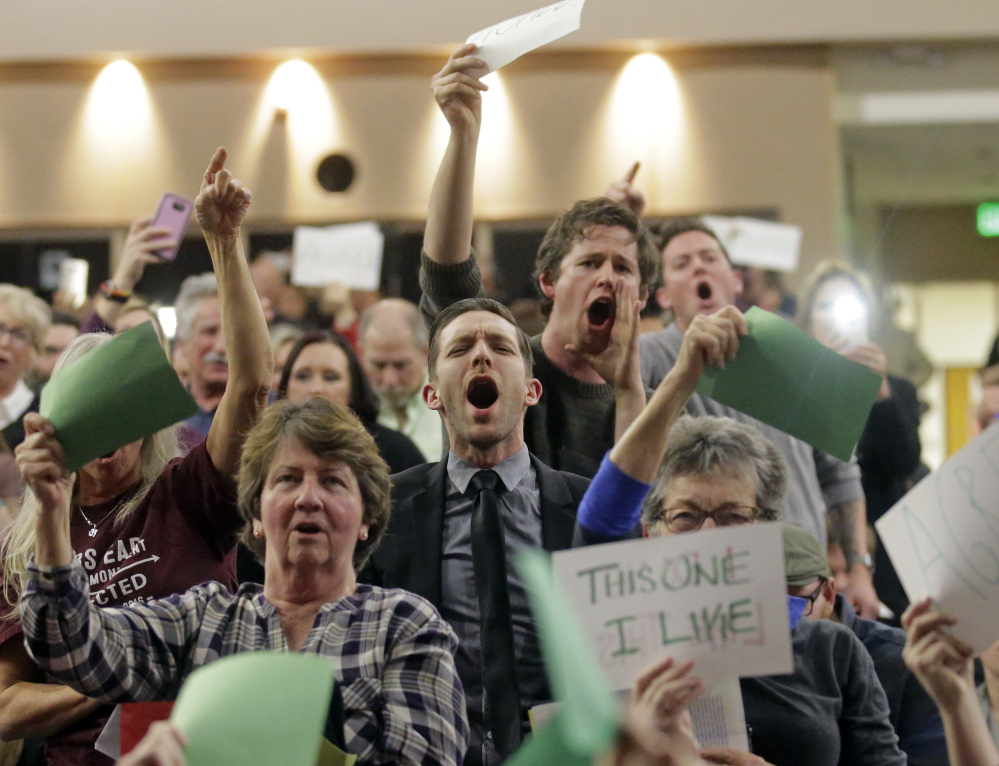GRAND RAPIDS, Mich. — The voter identified himself as a cancer survivor, and he had something to say to Republican Rep. Justin Amash: “I am scared to death that I will not have health insurance in the future.”
The comment earned 61-year-old retiree Paul Bonis a standing ovation from the crowd packed into a school auditorium in Amash’s Michigan district Thursday night. And the congressman was booed for his response: That the Affordable Care Act has “hurt a lot of people,” and he supports his party’s plans to repeal and replace it, even though Republicans still haven’t united around an alternative.
It’s a scene that’s played out around the country over the past several weeks as Republicans and President Donald Trump have assumed control of Washington and begun moving forward on their long-held promise to undo former President Obama’s health care law. In an echo of the raucous complaints that confronted Democrats back in 2009 as they worked to pass “Obamacare” in the first place, Republicans who want to repeal it now are facing angry pushback of their own at constituent gatherings from Utah to Michigan to Tennessee and elsewhere, even in solidly Republican districts.
And just as the protests in 2009 focused on health care but reflected broader concerns over an increasingly divisive new president and Democrats’ monopoly control over Washington, now, too, constituent complaints at town hall meetings appear to reflect more general fears about the Trump administration and the implications of one-party GOP rule of the nation’s capital.
In a Salt Lake City suburb on Thursday night, Republican Rep. Jason Chaffetz faced irate constituents chanting “Do your job!” as they pressed the House Oversight Committee chairman to investigate Trump. Chaffetz struggled to be heard as he faced a litany of sharp questions and screams from a crowd of people who grilled him on everything from Obamacare to Chaffetz’s desire to overturn a new national monument in southern Utah.
“Come on, we’re better than this,” Chaffetz protested over the hubbub at one point, practically pleading with the deafening crowd to let him speak.
In Tennessee, Rep. Diane Black faced questions from impassioned and well-informed constituents defending the Affordable Care Act, including one man who told her that he and others with health conditions might die without insurance. “And you want to take away this coverage, and have nothing to replace it with,” the man said. Black argued that the Affordable Care Act has been ineffective because although 20 million people gave gained coverage under the law, millions more have chosen to pay a fine and remain uninsured.
And in southern Wisconsin, Republican Rep. James Sensenbrenner faced a voter who asked him: “Who’s going to be the check and balance on Donald Trump?” Like others interviewed at town halls around the country, the woman asking the question, Barbara Kresse, said she has not been politically active, another similarity to 2009 when the advent of the Obama administration seemed to cause enough anxiety to awaken groups of voters who had never previously gotten involved.
Indeed the recent protests are being amplified by liberal activists modeling their opposition to Trump on the tea party groups that sprang up to oppose Obama and the Democrats. Calling itself “Indivisible,” a non-profit group that grew out of a how-to guide written by former Democratic congressional staffers has advertised town hall gatherings nationally, suggesting at least some level of coordination, which was the case with the anti-Obamacare protests as well.
Send questions/comments to the editors.



Success. Please wait for the page to reload. If the page does not reload within 5 seconds, please refresh the page.
Enter your email and password to access comments.
Hi, to comment on stories you must . This profile is in addition to your subscription and website login.
Already have a commenting profile? .
Invalid username/password.
Please check your email to confirm and complete your registration.
Only subscribers are eligible to post comments. Please subscribe or login first for digital access. Here’s why.
Use the form below to reset your password. When you've submitted your account email, we will send an email with a reset code.